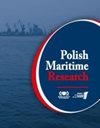采用先进燃料的船用柴油机燃料燃烧与排放特性试验研究
IF 2
3区 工程技术
Q2 ENGINEERING, MARINE
引用次数: 0
摘要
摘要为探索含氧燃料聚氧二甲基醚(PODE)作为船用柴油机替代燃料的潜在应用前景,在船用柴油机上测试了纯柴油、柴油混合聚氧二甲基醚和纯聚氧二甲基醚在不同工况下的燃料燃烧性能和气体排放特性。实验结果表明,柴油混合聚戊二烯和纯聚戊二烯均可降低氧耗。缸内压力和放热曲线与柴油的变化趋势一致。同时,混合聚戊二烯和纯聚戊二烯的点火延迟时间缩短,扩散速率加快,有利于提高柴油机的燃烧性能。柴油混合PODE和纯PODE分别减少了56.9%和86.8%的颗粒物(PM)排放,减少了51.1%和56.3%的CO排放。随着发动机负荷的增加,NOx排放量逐渐降低。二氧化碳排放量略有增加,有效油耗分别增加了48%和132%。结果表明,聚醚砜作为一种清洁的船用柴油机替代燃料,可以为船用柴油机提供相当的动力,改善发动机的燃料燃烧和气体排放。本文章由计算机程序翻译,如有差异,请以英文原文为准。
Experimental Study of Fuel Combustion and Emission Characteristics of Marine Diesel Engines Using Advanced Fuels
Abstract In order to explore the potential application of oxygenated fuels, polyoxymethylene dimethyl ethers (PODE), as an alternative fuel for marine diesel engines, the fuel combustion performance and gas emission characteristics of pure diesel oil, diesel-blended PODE, and pure PODE were tested on a marine diesel engine under different running conditions. The experimental results indicate that oxygen consumption can be reduced by diesel-blended PODE and pure PODE. The in-cylinder pressure and exothermic curve were consistent with the trend of diesel oil. Also, the ignition delay of diesel-blended PODE and pure PODE decreased, and the diffusion rate was accelerated, which helped to improve the combustion performance of diesel engines. Diesel blended PODE and pure PODE reduced the particulate matter (PM) emissions by up to 56.9% and 86.8%, respectively, and CO emissions by up to 51.1% and 56.3%, respectively. NOx emissions were gradually decreased with engine load. CO2 emissions were slightly increased, and the effective fuel consumption was increased up to 48% and 132%, respectively. It was shown that PODE could provide comparable power in a marine diesel engine and improve the fuel combustion and gas emission of the engine as a clean alternative fuel for marine diesel engines.
求助全文
通过发布文献求助,成功后即可免费获取论文全文。
去求助
来源期刊

Polish Maritime Research
工程技术-工程:海洋
CiteScore
3.70
自引率
45.00%
发文量
20
审稿时长
>12 weeks
期刊介绍:
The scope of the journal covers selected issues related to all phases of product lifecycle and corresponding technologies for offshore floating and fixed structures and their components.
All researchers are invited to submit their original papers for peer review and publications related to methods of the design; production and manufacturing; maintenance and operational processes of such technical items as:
all types of vessels and their equipment,
fixed and floating offshore units and their components,
autonomous underwater vehicle (AUV) and remotely operated vehicle (ROV).
We welcome submissions from these fields in the following technical topics:
ship hydrodynamics: buoyancy and stability; ship resistance and propulsion, etc.,
structural integrity of ship and offshore unit structures: materials; welding; fatigue and fracture, etc.,
marine equipment: ship and offshore unit power plants: overboarding equipment; etc.
 求助内容:
求助内容: 应助结果提醒方式:
应助结果提醒方式:


